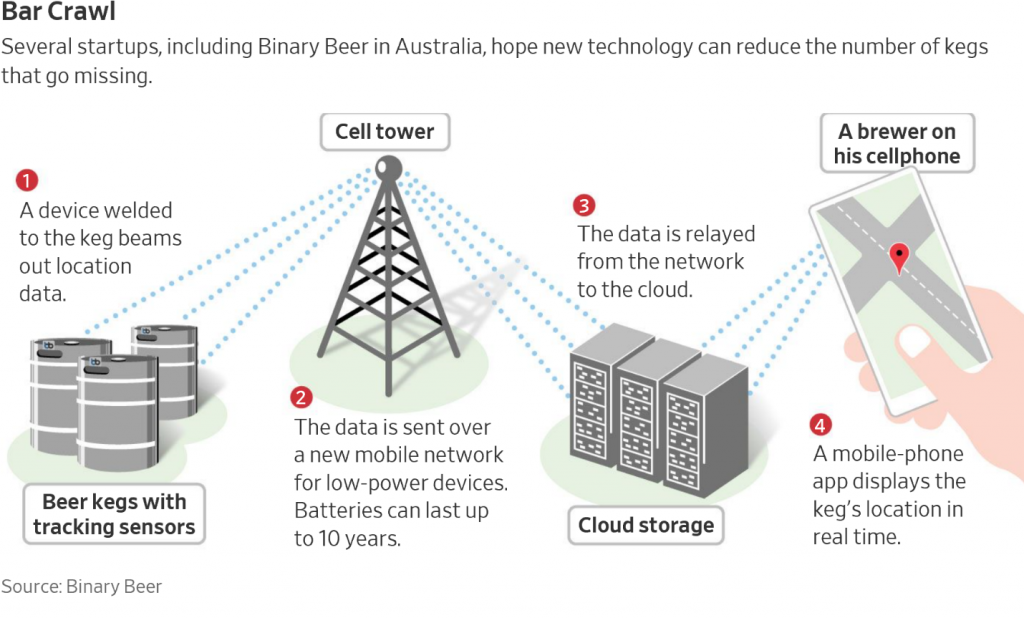Keg Trackers Keep Your Ale From Going AWOL Breweries lose as many as 10% of their steel kegs a year; new startups are hoping to stop that
Phil O’Shea, owner of Five Barrel Brewing in Wollongong, Australia, helped Binary Beer test tags that would make it easier to recover some of the many kegs that breweries lose each year. PHOTO: MIKE CHERNEY/THE WALL STREET JOURNAL By Mike Cherney
June 20, 2018 7:00 a.m. ET
WOLLONGONG, Australia—New technology could help brewers hold on to kegs until the bins are truly tapped out.
Startups from the U.S. to Australia are developing sensors to help beer companies keep track of their kegs, which frequently go missing en route from brewery to bar and back again.
“I think that most of the time people don’t understand that kegs are really valuable to breweries,” said Phil O’Shea, owner of Five Barrel Brewing in this city south of Sydney. “If a keg is looked after, then it can last 10 years or more.”
Large breweries buy tens of thousands of steel kegs every year, at about $100 apiece. As many as 10% go missing annually, brewers say. The barrels, often stored outside when empty, can be mistakenly collected by another brewery or stolen for home brewing or other purposes. Internet videos show how to make a fire pit, a pot and even a urinal out of a beer keg.
Mr. O’Shea, whose brewery has about 300 kegs, said 20 to 30 kegs have gone missing since it opened more than two years ago. That loss led him to help Binary Beer, a Wollongong startup, test an early prototype of its keg sensor.
The tags aim to help brewers keep track of the bins. Mr. O’Shea says 20 to 30 kegs have gone missing since he opened Five Barrel Brewing more than two years ago. PHOTO: MIKE CHERNEY/THE WALL STREET JOURNAL
Designed to run on batteries that will last up to 10 years, Binary Beer’s sensor transmits data about a keg’s location using a new mobile network from Vodafone Group PLC for low-power devices. Brewers can track the locations of their kegs in real time on a computer or smartphone and access additional information like temperature, so they can evaluate whether their beer is being stored correctly. Some investors think early results are promising. Binary is backed by global venture-capital fund Artesian, while Kirkland, Wash.-based startup C-Keg has support from Seattle-area tech investors, according to C-Keg Chief Executive Greg Herlin. Kegstar, a Sydney-based keg-rental business owned by logistics giant Brambles Ltd. that recently expanded to the U.S., is looking to develop a similar sensor. Companies world-wide are connecting everything from refrigerators and cars to the internet, though it remains to be seen whether high-tech kegs will be successful. Mr. O’Shea said he is interested in the new technology but that cost will determine whether he purchases any sensors. It isn’t clear how much pricier these “smart kegs” will be. Breweries might be able to buy the sensors outright or pay a subscription fee.
The sensors must also broadcast from diverse environments: a refrigerated storage area, a basement cellar or an alley behind a bar where empty kegs are often left. And “security of data would be an overarching concern,” said Costa Nikias, a brewery consultant who founded La Sirène Brewing near Melbourne; he isn’t involved with any of the startups. A competitor with unauthorized access to the data might be able to see where a rival is selling beer, he said.
Kegstar said it reduced its keg-loss rate to about 2%, using radio-frequency ID tags and bar codes on its more than 400,000 kegs. An average brewer “doesn’t have a team of people sitting there ringing up venues, ringing up warehouses and chasing up empty kegs,” said managing director Adam Trippe-Smith.
Still, Kegstar’s trackers must be hand-scanned by a device and they don’t broadcast locations in real time. Mr. Trippe-Smith said the company expects to invest in higher-tech sensors, which may connect to a low-power mobile network. Kegstar is in the process of testing prototypes.
Tags attached to kegs that transmit data would keep brewers abreast of their whereabouts. They could replace tags that must be manually scanned, like those used by keg-rental company Kegstar, above. PHOTO: MIKE CHERNEY/THE WALL STREET JOURNAL
So-called active tags, which automatically send data in real time and might use Wi-Fi and Bluetooth technology, can cost significantly more than passive tags that need to be scanned.
Richard Aufreiter, director of product management for identification technologies at HID Global, an Austin, Texas-based manufacturer of radio-frequency ID tags for kegs, said brewers may resist paying extra for active tags, even if they can read temperatures.
“It’s nice to have, but it’s a question of how much you’re willing to pay for it,” Mr. Aufreiter said. He estimated that active tags could be at least 10 times more expensive than the passive tags currently used by companies like Kegstar.
Michael Burton, a software engineer who founded Binary Beer with his wife, said any raw cost comparison is “a bit deceptive,” noting that radio-frequency ID tags require a brewer to pay people to scan them.
Current, manual-scanning methods for tracking a keg are “telling you where it is when you already know where it is,” he said.
Write to Mike Cherney at mike.cherney@wsj.com Appeared in the June 21, 2018, print edition as ‘Tech to Track Errant Kegs.’

